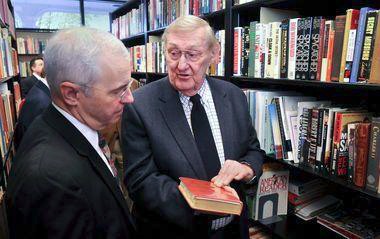Former U.S. Intelligence operator donates collection

Courtesy Photo / mlive.com Donald Markle, a contributor to the Haunstein Center, discusses a book he donated to GVSU
Dec 9, 2010
Grand Valley State University’s special collections library is home to more than 35,000 books, and earlier this November, Don Markel, 80, who worked 34 years for the U.S. Intelligence Department, donated 500 books from his collection to GVSU’s Hauenstein Center for Presidential Studies.
“The collection spans a number of espionage topics all of the way back to Queen Elizabeth,” said Gleaves Whitney, director of the Hauenstein Center for Presidential Studies. “So it starts in the 16th century and goes all of the way to recently released intelligence reports. There’s a lot on World War II. Ralph Hauenstein was very involved in decoding the German secrets in World War II.”
Although Markle was not available for comment from his home in Gettysburg, Penn., Whitney said he and Colonel Ralph Hauenstein met about 10 years ago when camaraderie started blooming between the two former spies.
“Don Markle realized how important Ralph Hauenstein was in the espionage efforts because of his role in World War II,” he said. “So he had the good idea to write a story, basically, about Ralph Hauenstein’s life.”
The book, co-authored by Hauenstein and Markle, is called “Intelligence Was My Line.” The relationship between Markle and Hauenstein may have prompted the donation, Gleaves said. Additional factors may have included a strong link between the new material and the existing Bergers Presidential collection the Hauenstein center hosts.
“There is an organic relationship between having books written by presidents and the operations they ultimately direct for national intelligence,” Gleaves said. “It’s a wonderful resource to have. We’re the only place in the world that has the combination of presidential material and espionage material under one roof – the only place in the world.”
Both Gleaves and Robert Beasecker, director of Special Collections at GVSU, agree the addition of Markle’s collection will add a mark of distinction to the university’s name – researchers from Harvard and other noted organizations have already been in contact about accessing the collection.
“I’ve already had individuals contacting me about the collection, and the fact that it contains both relatively common titles and scarcer works makes it very useful for researchers to have the materials available in one place,” Beasecker said.
Gleaves added aside from drawing in international scholars, GVSU’s own serious researchers and World War II buffs can benefit from the library’s newest addition, which hosts both serious intelligence papers and more light-hearted documents such as a title that aims at teaching spies how to play poker.
“On the other hand we might have somebody that’s a Harvard researcher come in and look at our resources, they might write a book or an article based on it, but the archive at the Hauenstein center will be cited,” Whitney said. “Grand Valley will be cited for quality and its contribution to expanding knowledge. It builds our cache, our esteem among scholars.”























